Book contents
- Frontmatter
- Contents
- Preface
- List of Abbreviations
- 1 Introduction: The Church and Anglicanism in the ‘long’ eighteenth century
- Part I The pastoral work of the Church
- Part II Crisis and reform
- 5 The Church, the societies and the moral revolution of 1688
- 6 John Locke, Jonas Proast and religious toleration 1688–1692
- 7 The origins and ideals of the SPCK 1699–1716
- 8 Cultural patronage and the Anglican crisis: Bristol c. 1689–1775
- 9 Latitudinarianism at the parting of the ways: a suggestion
- 10 Ecclesiastical policy under Lord North
- 11 The foundation of the Church Missionary Society: the Anglican missionary impulse
- 12 A Hanoverian legacy? Diocesan reform in the Church of England c. 1800–1833
- Part III Identities and perceptions
- Index
10 - Ecclesiastical policy under Lord North
Published online by Cambridge University Press: 13 October 2009
- Frontmatter
- Contents
- Preface
- List of Abbreviations
- 1 Introduction: The Church and Anglicanism in the ‘long’ eighteenth century
- Part I The pastoral work of the Church
- Part II Crisis and reform
- 5 The Church, the societies and the moral revolution of 1688
- 6 John Locke, Jonas Proast and religious toleration 1688–1692
- 7 The origins and ideals of the SPCK 1699–1716
- 8 Cultural patronage and the Anglican crisis: Bristol c. 1689–1775
- 9 Latitudinarianism at the parting of the ways: a suggestion
- 10 Ecclesiastical policy under Lord North
- 11 The foundation of the Church Missionary Society: the Anglican missionary impulse
- 12 A Hanoverian legacy? Diocesan reform in the Church of England c. 1800–1833
- Part III Identities and perceptions
- Index
Summary
In adopting as its subtitle ‘Was there a ‘resurgence of Toryism” in the 1770s?’, this essay threatens to take up a very familiar theme. As long ago as 1942, G. H. Guttridge claimed to identify a ‘New Toryism’ in ministerial policy after 1760 in his English Whiggism and the American Revolution and on its re-issue in the early 1960s, Professor Christie effectively demolished the idea. But there are perhaps two reasons why another study of at least one aspect of the subject, namely the ecclesiastical one, might be justified now. First, neither in his original essay nor in his more recent analysis of the personnel of the House of Commons in the 1770s, in which he illuminated a considerable degree of continuity between the Pelhamite ascendancy and that of North, did Professor Christie seriously consider ecclesiastical matters. Secondly, in the last few years, other works have postulated a Tory revival of at least some sort in the time of North. One thinks of J. A. W. Gunn's Beyond Liberty and Property and Paul Langford's demonstration that many representatives of old Tory families backed North's coercive policy and, by imbuing it with the ‘mindless authoritarianism’ of the country gentry, helped to create the conditions ‘without which an unprecedented war against colonists could not have been fought’. In 1989 Dr Bradley took this line of argument much further, writing of a ‘Resurgence of Toryism’ during the American Revolution.
- Type
- Chapter
- Information
- The Church of England c.1689–c.1833From Toleration to Tractarianism, pp. 228 - 246Publisher: Cambridge University PressPrint publication year: 1993
- 2
- Cited by



